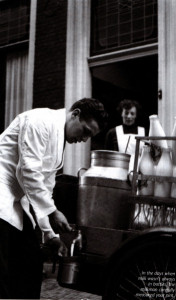
Teenage boys in need of cash often deliver newspapers or groceries or clean cars.
I went ‘on the milk’ with Hubert Jones. He was one of the local farming Joneses, with a family tree like a monkey puzzle, so many in number were they, all bound up with the life of our village, Bishopston, which was on the Gower Peninsula.
Hubert had a red face, a wrinkled forehead, bright eyes and a circle of spiky fair hair. He wore a blue overall coat and, usually, a broad smile.
The work began at 7am when 1 rode my bike down the rough track to Sunnymead Farm. I collected a two-gallon can of milk from the marble slab in the dairy, and then bumping and clanging, cycled back to Caswell Bay Road and delivered to the houses on the cliff top half a mile away.
By the time I returned, Hubert’s old car was waiting outside the farm cottage, loaded and ready for the road. The sweet creamy-fresh farm milk had not yet been replaced by the tasteless processed stuff now put on our cornflakes, but the boot contained a crate of processed bottled milk, and another of fresh milk, with the old-fashioned waxed cardboard tops. The front passenger seat was removed and a ten-gallon churn sat there instead. In place of the rear seat there was a mixture of tinplate delivery cans, pint and half-pint measures, the record books and a few cartons of cream.
Thump jump start
The car itself was well past its prime. The blue paint had faded, the roof lining was stained, the leather upholstery was cracked and the engine was started by the ‘run and thump’ method. This meant stopping at the best places along the route, with a downhill slope. The handbrake was released and the car would surge forward before the engine would kick start with a roar.
There were about 70 customers on Hubert’s round. We suffered recalcitrant dogs, harassing children, tormenting geese and loquacious customers. At some houses we could march up the path with cans a-clanging as usual, knock smartly on the door and sing out “Milko!”
At others we silently lifted the latch, crept along the crunching gravel drive, lowered the bottles gingerly onto the doorstep and ran for the gate, safe for the present but knowing that another day’s gossip would be saved for Saturday when money was collected. Then there would be no escape.
In summer sunshine it seemed to me no other job could be so enjoyable but in the drenching Welsh rain, Hubert and I slouched along, caped and gum-booted with old trilby hats pulled down over our eyes, pouring carefully into tinplate measures while trying to keep the rainwater out of the jug.
I was secretly rather proud of my ability to fill the pint measure to the very brim then transfer the contents to the waiting jug without spilling a drop. Some people had calibrated jugs, which saved time. Others had less exact methods of measurement and there was an element of guessing. The customer, knowing we erred on the high side, watched with glee.
Most people bought their milk on a weekly credit basis, but some paid daily. Others would not be seen for two or three months but then, unexpectedly, would be standing on the door, cheque book in hand, waiting for calculations to be made in the dog-eared, rain-smudged blue notebooks.
The majority of the customers were regarded as old friends -they received good service and appreciated it. A few of them had grounds for complaint, however.
Strung out along a narrow track there were some wooden bungalows, several of which were rented out as holiday homes. The comings and goings at these were unpredictable, as were the milk requirements of the various families.
As a result, these folk were often left until last, and if remaining supplies were short they might receive yesterday’s milk. At the height of summer a slab in the diary was no substitute for a refrigerator – a luxury seen in American films but never in a local Welsh kitchen. I would often have to abandon the round and get Hubert to placate some housewife whose cooking had gone awry.
A lady whom I only rarely saw, once lodged a complaint about me. I had knocked on the door, marched into the kitchen and poured the usual quantity into the jug on the scrubbed pine table, but then saw a fly floating on the surface. There was no utensil on the table or anywhere else, so I inspected my little finger, verified that it looked clean, and fished out the fly. However the old lady had been watching from the shadows of the hallway and witnessed all. When 1 left she went out to Hubert and demanded another pint.
I often did other jobs around Hubert’s farm; bottle washing, planting or picking potatoes, hedging and ditching, haymaking and driving an ancient TVO tractor. “Be careful with the muck on that tractor lad – it’s the muck that’s holding it together.”
When additional horsepower was needed I would borrow Prince, a giant Clydesdale, from another Jones and proudly lead him through the village to Sunnymead.
In the autumn of 1953 I left the milk round forever and began a job in the radio and TV trade in Swansea.
It was all changing anyway, for delivery of loose milk ended, and the old measures took their places on the walls of country cottages among the bed warmers and horse brasses. Sunnymead Farm disappeared under a housing estate and Hubert, still comparatively young, was soon to die. I very much doubt if stress contributed to his death.
At Sunnymead the hens and ducks laid their eggs where they pleased while Hubert entertained the local children, played with his baby daughter and chatted with the neighbours who came down the farm track to buy a few potatoes, a dozen eggs or an extra pint of milk.
John Talbot








